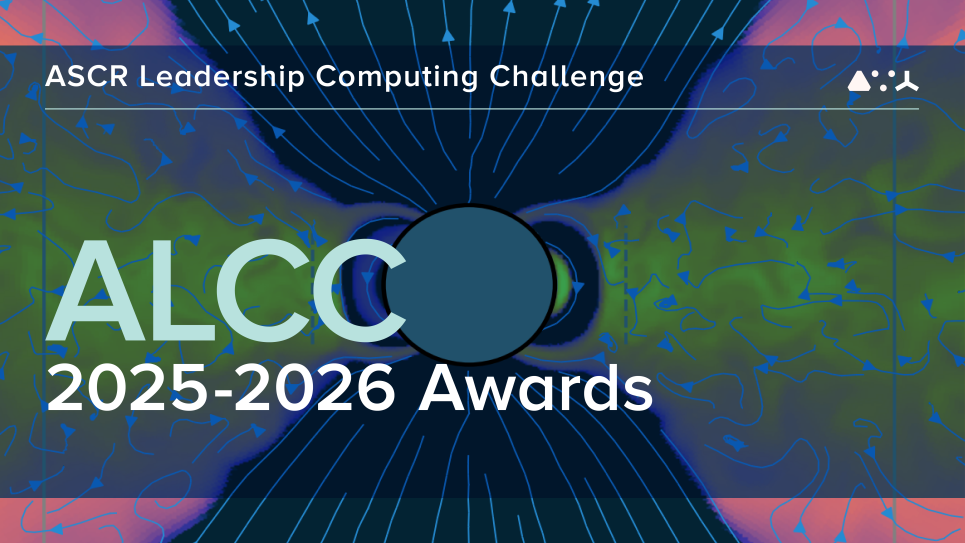
Department of Energy announces 25 projects awarded access to Argonne supercomputers for breakthroughs in AI, science and engineering
New ALCC projects will use the ALCF's Aurora and Polaris systems to pursue breakthroughs across a wide range of fields, including fusion energy, materials discovery, and AI-driven research.
The U.S. Department of Energy’s (DOE) Advanced Scientific Computing Research (ASCR) Leadership Computing Challenge (ALCC) has awarded supercomputing time at the Argonne Leadership Computing Facility (ALCF) to 25 projects pursuing breakthroughs in areas such as fusion energy, quantum chemistry and artificial intelligence for science.
The ASCR program, which manages some of the world’s most advanced supercomputing resources, selects ALCC projects each year that drive forward DOE mission priorities and expand access to leadership-class computing across the research community.
Through the ALCC program, computing time is made available at ASCR’s world-class facilities to scientists from universities, industry and government agencies. These facilities include the ALCF at DOE’s Argonne National Laboratory, the Oak Ridge Leadership Computing Facility (OLCF) at DOE’s Oak Ridge National Laboratory, and the National Energy Research Scientific Computing Center (NERSC) at DOE’s Lawrence Berkeley National Laboratory—all DOE Office of Science user facilities.
The list below highlights the 25 projects that were awarded time on the ALCF’s Aurora and Polaris systems. In total, the ALCC program awarded 56 projects across the DOE’s computing facilities, with additional projects receiving allocations at OLCF and/or NERSC. The one-year awards began July 1, 2025. To explore the full list of 2025–2026 awardees and project summaries, visit the ALCC website.
- Michal Bajdich from SLAC National Laboratory received computing time on Aurora and Polaris for “High-Precision Heterogeneous Catalysis by Quantum Monte Carlo.”
- Thomas Blum from the University of Connecticut received computing time on Aurora for “Hadronic Contributions to the Muon G-2 from Lattice QCD.”
- Jeff Candy from General Atomics received computing time on Aurora for “Turbulence Database for Fusion Energy Science.”
- Jun Fang from Argonne National Laboratory received computing time on Aurora for “Development of AI-Powered Application for Advanced Nuclear Reactor Design.”
- Ore Gottlieb from Flatiron Institute received computing time on Aurora for “Simulating Large-Scale Long-Lived Neutron Star Remnants from Binary Neutron Star Mergers.”
- Roelof Groenewald from TAE Technologies Inc. received computing time on Aurora for “Validation of Stability Simulations and Predictive Scaling Toward Next Step FRC Fusion Device.”
- Allan Grosvenor from Microsurgeonbot Inc. received computing time on Aurora for “Space Traffic Autonomy: Leadership Computing Advances Hierarchical Planning R&D.”
- Suhas Jain from Georgia Institute of Technology received computing time on Aurora for “High-Fidelity Simulations of Bubble-Laden Turbulent Flows with Surfactants.”
- Wei Jiang from Argonne National Laboratory received computing time on Aurora for “Microscopic Insight into Transport Properties of Li-battery Electrolytes.”
- Dheeraj Kapilavai from GE Aerospace Research received computing time on Aurora for “Integrated and Detailed Simulation of Combustor and Turbine Interaction in a Jet Engine.”
- Kibaek Kim from Argonne National Laboratory received computing time on Aurora and Polaris for “Privacy-Preserving Federated Learning for Foundation Models.”
- Mark Kostuk from General Atomics received computing time on Polaris for “Pathfinding Integrated and Automatic Experimental Analyses for DIII-D Research.”
- Emmanouil Koukoumidis from Oumi PBC received computing time on Polaris for “Causal Online Alignment for Reliable Foundation Models.”
- Taehun Lee from The City College of New York received computing time on Polaris for “High-Fidelity Simulations of Helium-Air Mixing in HTGR Cavities and Thermal Stratification in Sodium Fast Reactors.”
- Harshitha Menon from Lawrence Livermore National Laboratory received computing time on Aurora for “Training Multi-modal Models for HPC Code and Data.”
- Parviz Moin from Stanford University received computing time on Aurora for “Predicting Flow Distortions in Serpentine Engine Inlets.”
- Peter Nugent from Lawerence Berkeley National Laboratory received computing time on Aurora for “EMERGE: ExaEpi Calibration Runs and Surrogate Models.”
- Ivan Oleynik from the University of South Florida received computing time on Aurora for “High Energy Density Physics of Novel Inertial Fusion Energy Ablator Materials.”
- Bruce Perry from National Renewable Energy Laboratory received computing time on Aurora for “High-Fidelity Simulation of SAF End Use: Emissions and Operability Studies.”
- Noah Reddell from Zap Energy Inc. received computing time on Aurora for “Kinetic Plasma Model Investigation of Z Pinch Physics at Fusion Conditions.”
- Daniel Mejia Rodriguez from Pacific Northwest National Laboratory received computing time on Aurora for “Advanced Modeling for Two-Dimensional Materials and Transition Metal Oxides.”
- Nicholas Schwarz from Argonne National Laboratory received computing time on Polaris for “Enhancing APS-Enabled Research through Integrated Research Infrastructure.”
- Thomas Wester from the University of Chicago received computing time on Aurora and Polaris for “Enabling Exascale Discovery in Neutrino Science.”
- Yiqi Yu from Argonne National Laboratory received computing time on Polaris for “LES & DNS Simulation on Flow and Heat Transfer behavior in Involute Plate Research Reactor.”
- Zheng Zhang from the University of California, Santa Barbara received computing time on Aurora and Polaris for “Tensor-Compressed Sustainable Pre-Training of Extreme-Scale Foundation Models.”